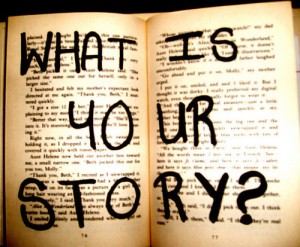Archive for October 2010
Inspiration: Nostalgia
Nostalgia: a wistful desire to return to a former time in one’s life, to one’s home, homeland, or to ones family and friends. A yearning for the happiness of a former place or time. I’m not sure what it is about autumn, especially once it starts going, but it always brings back good memories for me. This week’s inspiration is nostalgia. Here’s to the memories.




Action, Exposition

Aaand ACTION!
Here’s a small lesson on telling, but not necessarily showing. To a certain extent, telling or exposition is completely and absolutely necessary in your story or, you know, things wouldn’t make sense to us. The reason you’re inclined to write back story is, after all, to make sense of the present story. You write in a lot of telling, a lot of exposition, because you want your reader to understand. That’s natural.
But there’s a formula to it.
-
Current action.
-
Exposition.
-
Repeat.
With this formula, you’re forced only to describe when it’s necessary to understand what’s going on. Instead of describing the house a group of people are heading to and then cut to them knocking on the door, reverse it. Have them knock on the door and then describe the house, because then it’s necessary (maybe!) to know what the house might look like.
It’s a sort of method of payment for telling readers something you can’t simply show them. If you give them a present action to focus on, slipping in exposition so they can make sense of the scene is a natural flow.
Here’s the set up of the example:
The current action is Mindy going into the bathroom to brush her teeth. When she looks in the mirror, she notices that she isn’t quite herself today–she’s in her brother’s body. What do we need to know to understand this action? Perhaps that the room looks different, she feels different, etc.
In the first example, I have numbered the examples of blatant telling that, in my opinion, are either hidden well in the action or are needed to understand the present action. The numbers are evenly spaced through the narration. The paragraph seems short and to the point (although perhaps not really intriguing). In each case, the action comes before the exposition.
The second example switches the order, presenting exposition before the action it explains. It’s longer, and there’s actually more unneeded exposition (letters a-e) because there’s no limit. If you place the action first, you’re limiting what you can logically explain without jumping around. When you place the exposition first, you’re unrestricted!
Compare the two examples! Which do you think is better?
Action, Exposition:
Mindy slid out of bed feeling weird–groggy still, half-asleep and hazy. She walked across blue carpet (1) barely able to hold her eyes open before opening the door and heading down the hall to the bathroom. The hardwood was cold against her feet (2), her vision blurry as she glanced at the pictures lining the walls (3). She flipped on the light after stepping into the bathroom, wiggled her toes against the shaggy rug (4), and grabbed her toothbrush and toothpaste. She squeezed the white paste onto her brush, let cold water run on it, and then put it into her mouth. She squinted at her hands. They looked weird today. Maybe they were a bit swollen (5). She looked up to the mirror and almost swallowed her toothbrush whole–why was she looking back at her brother?
Exposition, Action:
Mindy slid out of bed feeling weird–groggy still, half-asleep and hazy. She looked down at the carpet, it was blue (1), and took a look around her room. There were blue walls, a bookshelf full of videogames (a). She frowned and rubbed her eyes. Must still be dreaming. She walked to the door, opened it, and headed down the ball to the bathroom. There were hardwood floors (2), pictures lining the halls (3), and glaring bright lights in the ceiling. The hall was two feet narrow (b) and in her sleepy, half-opened eyes, it looked much smaller than she was used to. She got to the bathroom and flipped the light on. It was all white, a tub against the far wall with a sea-horse shower curtain (c). There was a shaggy blue rug hiding the dull linoleum (4). She grabbed her toothbrush and toothpaste, let cold run onto it, and began brushing her teeth. Her hands looked swollen (5) as she stared down at them. They looked weird but she shrugged it off. Her eyes fell on the water running in the white porcelain sink (d). Above it was a medicine cabinet with a mirror (e). She looked up into it to assess how she looked and almost swallowed her toothbrush whole–why was she looking back at her brother?
A cool exercise to drive the point home is to pick up your favorite book, or a book by your favorite author. Read carefully and notice when the author is writing the present action and when they’re lacing in the exposition. You’ll notice the pattern, action first, exposition after! I promise.
Lesson 17
Agents agree that everyone who isn’t an agent and doesn’t have an agent has no idea what an agent’s average day is like.
Well, what about the average day of a writer?
It’s going to look very different for all of us, but the bottom line is the same: we’re busy! We often have day jobs, or night jobs, or both–kids, siblings, husbands, wives, parents to deal with–school, homework, papers, midterms, finals. It’s incredible how much we manage to pack into one day’s worth of hard work.
I’m a full-time student working unpaid at a psychology internship I started over the summer. On a day where I had my internship, two classes, a midterm, and a writing assignment due for creative writing, this is what happened:

A Vigilant Writer/Student
The Day in the Life of a Writer/Student/Intern
I stayed awake through 7am to write over 8,000 words on my manuscript to turn in for my English assignment. I took a shower and slipped into bed at 730am. I woke up at 1030am, clipped out an 11-page snippet of what I wrote the night before, read it over quickly and turned it in online. Went back to sleep until 1120am. Dressed, brushed my teeth, tried to make myself look presentable (probably failed in hindsight), packed food for the entire day, and took a 15-minute drive into Seattle (when President Obama was in town, even) to arrive at my internship at noon (okay, maybe 3 minutes after).
My supervisors fished around for 15 minutes trying to think of what I should do. I honestly told them I’d love to go back home to study, which they decided I could do that and come in tomorrow to make up the three hours. I took another 15 minutes to drive home, slipped into pajama bottoms and back into bed. I reorganized the Contents page, added a few pages to the list even, started this post, tweeted, read up on the blogosphere. Around 130pm I cracked open my textbook and started taking notes on what I knew I really needed to know.
Around 2pm I took a break and continued writing this post. At about 230pm I hit the textbook again for another 30 minutes, keeping track of only the most important items that’d be on the test. I planned on going to my next class but decided to skip it (sorry, professor) in favor of more studying. So I took the next two hours to study and talk to Devin about the writing process.

Seattle Rainy Traffic
At 5pm, I changed back into a pair of jeans and packed up for class. I drove 30 minutes to the other side of Seattle to my university–in light traffic (although it was 5pm, don’t know where everyone was). I had a double shot of espresso as I drove. It didn’t take me long to find parking and 5 minutes to walk to my first class. I waited in the hall for half an hour with a classmate before my next class started–my dreaded midterm. Instead of studying, we mostly talked about an English teacher we shared, about applying to graduate school, and how hard we thought the test was going to be. At 6pm, the test started.
I took it in an hour, drove back home at around 645pm, make a quick dinner of left-over chicken-flavored rice. I talked to my mom for about an hour, exchanging rants and bonding over stories of my freshman year. Then I opened up my manuscript and worked on my first chapter so I could send it to my crit partners–at 815pm.
By this time, I had been awake for 32 hours and had two shots of coffee. I worked on my manuscript until 3am, when my eyes were burning so bad I didn’t have any choice left to sleep.
So, what’s the lesson here?
Writing is rarely the only thing a writer does.
Your Query Hook
The hook for your query is hard to pin down, it’s true. Is it this, or that, or maybe this and that?
Here’s a list to help you figure out what your hook could be:

- Your conflict.
- Your climax (but not necessarily your resolution).
- The most INTERESTING thing about your main character that sets them apart from everyone else in the world.
- The most INTERESTING thing in your story that we’ll be dying to read by the end of your query.
- What your main character was doing right before the catalyst point, where things for your MC changed completely–but only if it’s INTERESTING.
- The catalyst point for your MC, when things start to change.
- One-half of that mystery you’re saving until the end.
- A combination of the above.
For me, my hook could be that my MC has lived alone with her father for ten years (what happened before the catalyst point) and now the goddess of the underworld is threatening to take her father away (catalyst point).
What about you?
Just a reminder! We’re looking for queries to critique in a positive and friendly way here on our blog. We are not experts, but we have an opinion and sometimes that’s good enough. If you’re struggling and would like a friendly opinion, send it in! You can find our email on the Contact page.
Sage Advice from Last Week
Mondays are for what gave us an a-ha moment. I was shown this post from J.A. Souders’ blog about senses. We’re all used to the five senses, but she introduces you to six more you can use in your writing. The six other senses to enhance your stories are: Time, Temperature, Pain, Balance, Motion and Direction

Arson is bad for the soul.
She went through an exercise to practice this and I think it can only help to do it too! I didn’t follow her example to a key, but here is my try.
Logan teetered on his feet, passing his thumb through the flame of his lighter. His skin sizzled, his mouth easing into a smirk as flames encompassed the house and the wood siding crackled in the heat. A scream rose above the flames and dissipated into the night. Only twenty minutes to ruin someone’s life–twenty minutes to provide hours of entertainment.
The fire licked at his skin and the thick, black smoke burned his throat–tasted like cheap cigarettes and dark roast coffee. He’d hoped for something more exciting. The acrid scent of cedar and boiling paint was nothing. He turned to the left and dropped his lighter on the ground. Whoever said revenge was best served cold was a complete liar.
And to break it down for the six new senses, here they are in plain sight! (Just in case you missed it in the paragraph.)
- Time: twenty minutes
- Temperature: heat.
- Pain: sizzled
- Balance: teetered
- Motion: passing, turned, teetered
- Direction: to the left
Now that I’m aware of them, I can tell my writing will be that much better! What do you guys think? Try it out and post it up, I’d love to see your take.
Inspiration: Lust
So overly sexy that it drives people to do crazy things. So dangerous that it was named one of the Seven Deadly Sins. Stronger than any other sexual emotion, it’s like playing with fire. Lust is beautiful and deadly, and it’s this week’s inspiration.




Symbolism – Red!
Going back to the symbolism post two weeks ago, we’re going to go over the color red! Red is a beautiful color with many meanings, which I’m sure most of us can guess. Red can show love, lust, anger, hatred, the list could go on forever. Red is an intense and powerful color that demands your attention whether you want to give it or not. It’s well known that red is used in advertising to attract customers, especially with food because the color red makes you hungry.
 Let’s start with the positive:
Let’s start with the positive:
- Red is sensual and passionate.
If that female lead of yours has ruby red lips, well… watch out boys! Why does red make people feel so sexy? Humans flush when we’re aroused–and most often, arousal is sexy. But what about that red tie your main man has? It creates a sense of power. (Ever noticed the President wearing a red tie when they need to showcase their prowess?) Like I’ve said, red draws attention. If you’re confident enough to have that attention, that shows power. Confidence = power, people!
Now for some negative:
- Red can symbolize hate, anger, warnings, stops, blood and so much more.
Warnings and saying stop are because (once again) red gets our attention. Anger and hate can get our pulse racing, just like red. We also tend to flush a nice red whenever we get horribly upset.
Different reds can mean different things, too:
- Light red can mean joy, passion and love.
- Dark red is associated with vigor, rage/anger, courage, malice, and wrath.
- Red-orange relates to desire, pleasure, domination, and aggression.
- Red-violet is a calm vitality, and is associated with sensuality.
- Red-brown can indicate harvest and fall.
Red is a great color that can give a nice pop to your descriptions, whether it be red lips, red hair, red tie or who knows, maybe even red eyes. Don’t be afraid to use this color, it’s your best friend. (Maybe even more than that.)
Lesson 16
So you’re in the middle of your book or in the middle of writing a chapter. And then voila! You’ve got another idea that won’t be able to fit into your story. What to do?

Train your ideas, ladies and gentlemen~
This happens to me sometimes. Most often when I’m the middle of class or in the shower (oh the inconvenience!) and the idea will niggle and nag at me forever. Then when I go to write something I’m supposed to, I just can’t write it because that other darn idea won’t let up. It’s like a hyperactive puppy in face of a treat, suffocating the presence of your patient, old dog. Well, can’t just ignore the puppy. You’ve gotta give it some attention. Get that idea on paper (or a word document) and get it out before it festers.
Along the same lines, what about those scenes that just can’t get out of your head. You want to write chronologically, but you’re just so uninspired for this next scene. That pivotal scene in chapter sixteen though… It’s already got itself planned out and it just keeps expanding. If a puppy’s taking to learning to roll over, are you going to continue trying to teach it to shake? No. You’re going to do what he’s better at! Otherwise that puppy’s never going to get trained. (Just like your idea!)
So, keep that puppy in check but don’t forget your beautiful old dog! Give them a little love and they’ll give you some love.
The Perfect Writer Biography for a Query

Your Resume. Be sure to attach it to your query.
Last week I promised the perfect biography paragraph for a query that’d incorporate the ten best things to mention about yourself in your query. I couldn’t forget the most important part of the perfect query formula, either. Well, after much editing and pizazz-ing, here you are:
My name is Jessica Lei. I turned 22 several days ago–can’t believe you missed my birthday, but I’ll forgive you. When you’re my agent, I won’t be so nice. I started writing when I was 12. I posted my work at an online community and received a lot of attention. I never finished any of it, though, but it was just kiddy stuff anyway. I’ve been writing since then but I’ve never been published. That’s probably because I haven’t tried yet. The novel I’m pitching to you now took me a month to write. Another one took me a month and a half. The one I’m working on now, the sequel to this book I’m querying you about, should be done in a week. Let me know if you want to read that, too.
I graduated high school three years ago. I’m currently attending a private university in Seattle, Washington. My book takes place in the Pacific Northwest so I know all about it and I can portray it accurately, unlike other famous authors who’ve placed their book here and didn’t actually visit until after they made a lot of money. Whatever! I’ll be graduating with a psychology major and an English minor this spring. Exciting, right? After I get out of this hellhole, I can write books a lot faster. I can make you a lot of money, I promise.
I researched a lot about my book. It’s set all over the world so I looked up pictures on Google and researched on Wikipedia. I’ve also been e-stalking you for the past few months. I know a lot about you and I’m querying you because I know you’d be my perfect agent. I also know all about your agency and your preferences, and how you’d like your submissions. I’ve included all the materials you asked for, and a bit more just in case. I like to cover my bases. This way I can assure you I’ve done my research and I’m qualified to write a book.
I’m not published or self-published or e-published. I have a blog where I’ve posted at least 15 articles on querying and getting published and writing a bestseller. I wrote several essays while I’ve been in college. My most recent was a reflection essay on substance abuse. Before that, I wrote about Shelley’s Frankenstein and Conrad’s Heart of Darkness, the ethics of child electroconvulsive therapy, women in Buddhist films, a research project on the effects of children on the emotion regulation of college students, and a literature review on single parenthood. I do not keep a diary, but my blog is located here: https://jddeshaw.wordpress.com. I’ve attached it all to this e-mail, including all of my blog entries, if you’d like to take a look to verify my writing abilities.
I worked for Starbucks for over 3 years but I quit to start volunteering and interning at a local research university in Seattle. I’m currently interning for [researcher, redacted] at [university department]. I do a lot of data entry, organizing, literary searches, and tracking (a form of stalking). I’ve babysat and worked at daycares as well. So, on top of the whole high school thing, I can probably write MG as well as YA. I’ve asked previous teachers, bosses, professors, and friends to write me letters of recommendation. I have attached them for your perusal.
I look forward to hearing from you! Thank you for your time and consideration.
Sincerely,
Jessica Lei
Well, there you have it! In case you missed it, here’s the key take-away:
Make sure your author biography is longer than your book summary. You are more important than your book!
We’re also looking for a few queries to critique on the blog–no harsh words or biting criticism, we promise. We are not experts, but we have an opinion and sometimes that’s good enough. If you’re struggling and would like a friendly opinion, send it in! You can find our email on the Contact page.
Sage Advice from Last Week

How do you see things?
Last week we tackled point of view for our lesson. We weren’t the only ones! Theresa Stevens from Edittorrent wrote about point of view as a sliding scale over at Romance University. You can’t even imagine how quickly I read this post (and reread) because it gets straight everything I’ve been uncertain on.
A professor of mine recently told me that I was writing too objective for what I was trying to do. He wanted more than what my characters were doing, he wanted to know what they were thinking. I thought being subjective meant that everything was merely colored by my main character’s perception.
Guess not.
It’s a bit more than that. Readers won’t know if it’s through your main character’s viewpoint if you never make it explicit from the start. They’ll likely think your narrator is jumping out and making some kind of comment. So here’s a few things I’ve learned to get your point of view straight:
- Start objectively. This allows you to describe what your main character looks like. A lot of books do this! And it’s okay to!
- Slide into subjective by showing your main character’s thoughts.
You can do it in single quotations. ‘Hmm,’ she thought, ‘that’s not right.’ Or perhaps you’re better acquainted with italics: Hmm, that’s not right, she thought. Or you can be sneaky and perhaps slip completely into the brain of your main character, almost as if you’re slipping into first person entirely (She dropped her fork with a gasp. I can’t believe what I’m seeing).
- Slide in and out of objectivity and subjectivity. Be conscious of what you’re writing.
You need to equally show actions (objective) and thoughts (subjective) throughout your book. Some scenes will require more objectivity and less subjectivity, or vice versa. No one wants too many thoughts, it slows down the pace–but when you want to slow things down, throwing in thoughts (even stream-of-consciousness can be fair play depending on your writing) can help you.
- Never, ever switch viewpoints. You can’t be in one person’s head and then another person’s head when you’re writing subjective. That’s omniscient. (Tricky, isn’t it!)
- Once you’ve gone into someone’s head, you can’t come out of it. If you’ve given us a taste of their thoughts, you have to let us take nibbles the entire book. We’ll remember what it tasted like, we’ll never forget it, and we won’t forgive you from withholding it from us.
Point of view is a tricky subject. I hope this post can bring another round of clarity!
